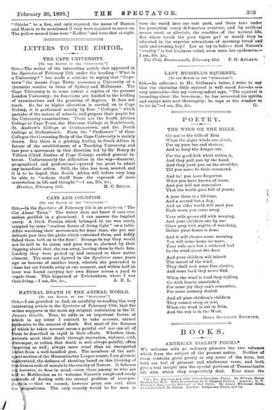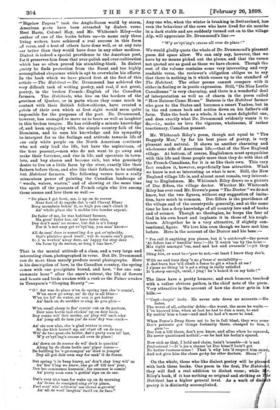BOOKS.
AMERICAN DIALECT POEMS.*
WE welcome with no ordinary pleasure the two volumes which form the subject of the present notice. Neither of them contains great poetry in any sense of the term, but both are full of pleasant and wholesome verse, and both give a real insight into the special portions of Transatlantio life with which they respectively deal. Ever since the • (1.) The Hatitant, and other French-Canadian Poems. By William Henry Drummond, M.D. With Ilinstrations by F. Simpson Coburn. London : G. P. Pmnem's Sons.—(2.) Rubaucit of Doc Sifere. By James Whitcomb Riley. thu.tratell by C. M. Belyea. London: Long mans, Green, and Co.
Bigelow Papers " took the Anglo-Saxon world by storm, American poets have been attracted by dialect verse.
Bret Harte, Colonel Hay, and Mr. Whitcomb Riley—the author of one of the books before us—to name only three living writers, have achieved a real success in this form ..of verse, and a host of others have done well, or at any rate -tar better than they would have done in any other medium.
Dialect is indeed a special providence to the American poet, for it preserves him from that over-polish and over-cultivation which has so often proved his stumbling-block. In dialect poetry he finds protection from the flaent and too highly accomplished eloquence which is apt to overwhelm his efforts.
In the book which we have placed first at the foot of this article — The Habitant — Dr. Drummond has achieved the very difficult task of writing poetry, and real, if not great, poetry, in the broken French - English of the Canadian farmers. The ]Iabitants, who live on the borders of the province of Quebec, or in parts where they come much in contact with their British fellow-citizens, have created a patois of their own which at first sight would seem quite impossible for the purposes of the poet. Dr. Drummond, however, has managed to move us to tears as well as laughter in this broken tongue. He has evidently a minute knowledge of, and keen sympathy with, the simple country folk of the Dominion, and he uses his knowledge and his sympathy to interpret for us the feelings and attitude towards life of Lne only white people on the North American continent who not only lead the life, but have the aspirations, of the true peasant,—men who do not want to go away and make their fortunes, and rise in life, and speculate in town. lots, and buy shares and become rich, but who genuinely desire to live on a little farm by the river, exactly like their fathers before them, and also like their fathers, to be nothing but Habitant farmers. The following verses have a really miraculous power of painting the Canadian landscape of " woods, waters, wastes," and of showing at the same time the spirit of the peasants of French origin who live among these scenes and love them so well :—
" De place I get born, me, is up on de reever Near foot of de rapide dat 's call Cheval Blanc Beeg mountain behin' it, so high you can't climb it An' whole place she 's mebbe two bonder arpent.
De fader of me, he was habitant farmer, Ma gran' fader too, an' bees fader also, Dey don't mak' no monee, but dat is n't fenny
For it 'a not easy get ev'ryt'ing, you mus' know—
All de sam' dere is somet'ing dey got ev'ryboddy, Dat's plaintee good healt', wat de monee can't gees', So I 'in workin' away dere, an' happy for stay dere On farm by de reever, so long I was leev."
That is the mental attitude of a class, and a very large and interesting class, photographed in verse. But Dr. Drummond can do more than merely produce moral photographs. Here is his description of how, in the Canadian country, the spring
comes with one precipitate bound, and how, " for one con- summate hour" after the snow's retreat, the life of flowers and beasts and birds awakes with a rush as the Palace awakes in Tennyson's "Sleeping Beauty ":—
" 0 ! dat was de place w'en de spring tam she 's comin', W'en snow go away, an' de sky is all blue- W'en ice lef' de water, an' sun is get hotter An' back on de medder is sing de you glou-
W'en small sheep is firs' comin' out on de pasture, Deir nice leetle tail stickin' up on deir back,
Dey ronne wit' deir moder, an' play wit' each oder An' jomp all de tam jus' de sam' dey was crack—
An' ole cow also, she 's glad winter is over,
So she kick herse'f up. an' start off on de race Wit' de two-year-ole heifer, dat's purty soon lef' her,
W'y ev'ryt'ing's crazee all over de place!!
An' down on de reever de wil' duck is quackin' Along by de shore leetle san' piper ronne- De bullfrog he 'a gr-rompin' an' dere is jompin'
Dey all got deir own way for mak' it de fonne.
But spring 's in beeg hurry, an' don't stay long wit' us
An' firs' t'ing we know, she go off till nee year, Den bee commence hummin', for summer is comin'
An' purty soon corn 's gettin' ripe on de ear.
Dat's very nice tam for wake up on de morning
An litsen de rossignol sing ev'ry place, Feel sout' win' a-hlowite see clover a-growin'
An' all de worl' laughin' itself on de face." Any one who, when the winter is breaking in Switzerland, has seen the behaviour of the cows who have lived for six months in a dark stable and are suddenly turned out on. to the village Alp, will appreciate Dr. Drummond's line :—
" W'y ev'ryt'ing's crazee all over de place !"
We would gladly quote the whole of Dr. Drummond's pleasant poem did space allow. We can only say, however, that we have by no means picked out the plums, and that the verses not quoted are as good as those we have chosen. Though the rest of the volume contains some very interesting and very readable verse, the reviewer's obligation obliges us to say that there is nothing in it which comes up to the standard of The Habitant. The other poems cannot compare with it either in feeling or in poetic expression. Still, "De Nice Leetle Canadienne " is very charming, and there is a wonderful deal of interpretation as well as of charm in the poem called " How Bateese Came Home." Bateese is the Habitant farmer who goes to the States and becomes a smart Yankee, but in in the end comes back and settles down on his father's old farm. Take the book as a whole, it is a most delightful one,. and does exactly what Dr. Drummond evidently wants it to do,—i.e., make us love the vigorous, wholesome, if rather reactionary, Canadian peasant.
Mr. Whitcomb Riley's poem, though not equal to "The Raggedy Man," by far his best piece of poetry, is very pleasant and natural. It shows us another charming and wholesome side of American life,—that of the New England village. At bottom, of course, Englishmen must sympathise- with this life and these people more than they do with that of the French-Canadians, for it is so like their own. This very fact renders it, however, superficially less attractive. What we know is not so interesting as what is new. Still, the New England village life is, and almost must remain, very interest- ing to Englishmen. Mr. Whitcomb Riley draws us a pictura of Doc Sifers, the village doctor. Whether Mr. Whitcomb Riley has ever read Mr. Brown's poem " The Doctor " we do not know, but the two figures, without any suggestion of imita- tion, have much in common. Doc Sifers is the providence of the village and of the countryside generally, and at the same time he has a deep knowledge of all country lore and of hooka and of science. Though no theologian, he keeps the fear of God in his own heart and implants it in those of his neigh- bours. Altogether he is a very attractive, if slightly con- ventional, figure. We love him even though we have met him before. Here is the account of the Doctor and his bees:-
" You call it anything you please, but it 's witchcraft—the power 'At Sifers has o' handlin' bees !—He '11 watch 'em by the hour— Mix right amongst 'em, mad and hot and swarmin' !—yit they
won't
Sting him, er want to—'pear to not,—at least I know they don't_
With me and bees they 's no p'tense o' socialbility- A dad-burn bee 'u'd climb a fence to git a whack at me!
I s'pose no thing 'at 's got a sting is railly satisfied
It 'a sharp enough, ontel, i jing ! he 's honed it on my hide !"
The lines have a pretty humour, and such humour, touched with a rather obvious pathos, is the chief note of the poem_ Very attractive is the account of how the doctor gets in his bills:—
" 'Cept—keepin' books. He never sets down no accounts.—He hates, The worst of all, collectin' debts—the worst, the more he waits.— I 'ye knowed him, when at last he had to dun a man, to end By makire him a loan—and mad he had n't more to lead.
When Pence's Drug Store ust to be in full blast, they wuz some Doc's patients got things frekantly there, charged to him, i gum !— Doc run a bill there, don't you know, and anus when he squared, He never questioned nothin',—so he had his feelin's spared.
Now sich as that, I hold and claim, hain't 'scusabls—it 'a not Perfessional !—It 's jes a shame 'at Doc hissel hain't got No better business-sense I That 's why lots 'd respect him mor And not give him the clean go-by fer other doctors. Shore!"
On the whole, those who like dialect poetry will be plea a with both these books. One poem in the first, The Habita
they will find a real addition to dialect verse; while r. Riley's book, if it has nothing so original and striking as Habitant, has a higher general level. Ass work of di poetry it is distinctly accomplished.







































 Previous page
Previous page